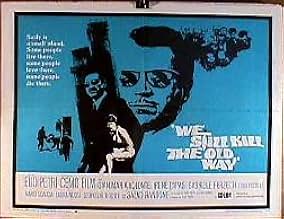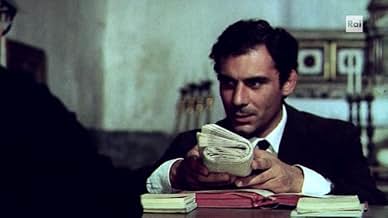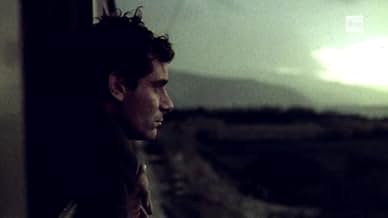IMDb RATING
7.0/10
2.1K
YOUR RATING
In Sicily, a leftist professor investigates the "honor killings" of two friends, uncovering a tangled web involving politicians, the Mafia, the Church, and the widow of one of the victims.In Sicily, a leftist professor investigates the "honor killings" of two friends, uncovering a tangled web involving politicians, the Mafia, the Church, and the widow of one of the victims.In Sicily, a leftist professor investigates the "honor killings" of two friends, uncovering a tangled web involving politicians, the Mafia, the Church, and the widow of one of the victims.
- Director
- Writers
- Stars
- Awards
- 6 wins & 2 nominations total
- Director
- Writers
- All cast & crew
- Production, box office & more at IMDbPro
Featured reviews
At the beginning of the movie a pharmacist receives an anonymous letter that threatens him of death. And the murder actually happens. Seems very simple but nothing is what it seems and the journey to the truth will be long and difficult. The book is excellent and the movie is at par with it and very faithful to the romance. Great direction. Incredible cast with Gabriele Ferzetti in his best interpretation together with the one in "C'era una volta il West" and Gianmaria Volonté simply beyond reach as always. Many other great actors. Yes I am an enthusiast 'cause there's not a word or a shot out of place in this movie and the plot is ingenious. Who is going to see this film for the first time will be taken away by the developments (the pace seems to be calm but looking in between the kinks you may realize that many things are going rapidly on). Trying to figure out what is the kernel of the happenings and the "reasons" for the murder is a very interesting exercise but it's highly unlikely for the spectator not to experience a big surprise at the end. In my opinion Elio Petri at his best (I mean at the same level of his other masterwork: La classe operaia va in Paradiso).
The Elio Petri film is unimpressive though it won the Best Screenplay Award at Cannes. Guess the subject and the story telling were interesting in 1967, Interesting to see Irene Papas in a negative role.
A left-wing professor stressed by moral doubts (Gian Maria Volonté) has the rather strange idea to try to break the ambiant omerta in order to clear the violent death of two friends, honor issues happening just to conceal quite more material interests. But Sicily and its little folk of mute but watchful characters don't seem ready to accept this kind of trouble. Bound with beauty but ungraspable like the doctor's few disconsolate widow (Irene Papas), the island and its stifling sun know how to subdue the one who dares to upset their immutably established order, between a conspicuous church and an invisible mafia.
This is a good, solid, beautifully photographed crime thriller. My misfortune was to pick this film to watch the night after watching, Illustrious Corpses. Now that Italian political crime thriller made in 1976 and based upon a book by Leonardo Sciascia is a near faultless classic with deep undertones and a broad scope that is simply a joy to watch. This, it turns out, is another film based upon another book by Leonardo Sciascia from 1967. How much more sensible it would have been to watch this one first. The thing is there is nothing wrong with this film except it is also about too easily explained killings that the lead character sets out to investigate and in the process overturns a hornets' nest, but there is much less action, intrigue and politics. Gian Maria Velonte is excellent as the professor who takes it upon himself to get involved when most people seem not to care. Interestingly this was the film that helped to lift this actor into more 'serious' films, after having made many spaghetti westerns, one of the last being face to Face also from 1967 when he also played a professor.
Although drawn from a powerful novel by Leonardo Sciascia, this results in an oversimplified, well-meaning social mystery set in 1965 Sicily, where two men are killed during a hunting party. A leftist professor (Gian Maria Volonté, a much better actor in the later Petri offering "Indagine su un cittadino al di sopra di ogni sospetto") decides to investigate the murders, only to find himself entangled in a spiderweb of corrupt politicians, "mafiosi" killers and sinister Church connections: the anonymous letters received by the victims - and, in due time, by the professor himself - were made with clippings from the Vatican newspaper "L'Osservatore Romano". There is also a fascinating dark lady character, a victim's widow, played by the splendid Irene Papas, whose black-stockinged legs wink through the whole film to the shy, undecided professor. When he resolves to take the woman, in a love scene near the end of the movie, it is unfortunately too late... The film can still be seen with some fun, but it's far from a serious rendition of the novel and it's not perhaps among the best Mafia movies made in Italy at the time. It's curious to note how so-called "spaghetti westerns", for instance, were often much more effective in describing corrupt politicians and Mafia-governed southern towns than their "mainstream" counterpart, like this typically engagé movie. I found also irritating the use of Cinemascope combined with low angles, continuous camera movements and extremely close shots, so that the narrative pace is fragmented and, more often than not, disturbed.
Did you know
- TriviaFilm debut and only film performance of Anna Rivero.
- ConnectionsEdited into Lo schermo a tre punte (1995)
- SoundtracksPour rêve l'hiver
("A Dream for Winter") (uncredited)
Lyrics by Arthur Rimbaud
Music by Luis Bacalov
Sung by Léo Ferré
- How long is We Still Kill the Old Way?Powered by Alexa
Details
- Runtime
- 1h 39m(99 min)
- Sound mix
- Aspect ratio
- 1.85 : 1
Contribute to this page
Suggest an edit or add missing content






























